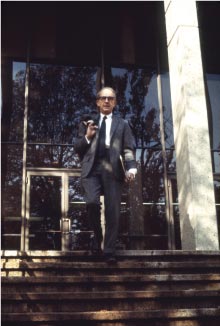 Peabody College’s expertise in special education dates back to at least 1937, when it established its Child Study Center to examine reading disabilities. Speech therapy was added in 1944 and a training program for teachers of the blind in 1953. But it was the groundbreaking work of Peabody-based special education and psychology researchers such as Susan Gray, Lloyd M. Dunn and particularly Nicholas Hobbs that led to the founding of the Vanderbilt Kennedy Center for Research on Education and Human Development in 1965.
Peabody College’s expertise in special education dates back to at least 1937, when it established its Child Study Center to examine reading disabilities. Speech therapy was added in 1944 and a training program for teachers of the blind in 1953. But it was the groundbreaking work of Peabody-based special education and psychology researchers such as Susan Gray, Lloyd M. Dunn and particularly Nicholas Hobbs that led to the founding of the Vanderbilt Kennedy Center for Research on Education and Human Development in 1965.
Hobbs, a pioneer in developing new concepts for treating children with emotional problems and children with intellectual disabilities, served as the first director of selection and research for the Peace Corps, headed by Sargent Shriver. Hobbs became a close friend of Shriver and his wife, Eunice Kennedy Shriver, whose sister Rosemary was born with intellectual disabilities. Eunice Shriver directed the Joseph P. Kennedy Jr. Foundation, a research and advocacy group for people with mental retardation and their families, and urged her brother, President Kennedy, to make mental retardation a priority of his administration.
As a result, the president formed the National Institute of Child Health and Human Development (NICHD) and the President’s Panel on Mental Retardation, on which Hobbs served. Recommendations by the panel led to the Maternal and Child Health and Mental Retardation Planning Amendment to the Social Security Act, the first major legislation to combat mental illness and intellectual disabilities. On Oct. 31, 1963, Kennedy signed additional legislation to construct a national network of Mental Retardation Research Centers.
In May 1965, Peabody received $2.4 million from the NICHD, committed $1 million of its own in matching funds, and received $500,000 of an eventual $1 million grant from the Kennedy Foundation to fund a Center for Research and Human Development at Peabody. It was one of 12 original centers in the national network.
—Kara Furlong
Sources: Peabody College: From a Frontier Academy to the Frontiers of Teaching and Learning
by Paul K. Conkin and www.jfklibrary.org